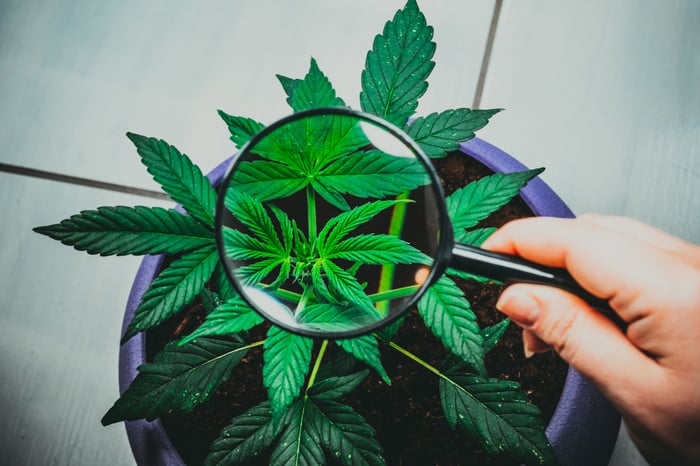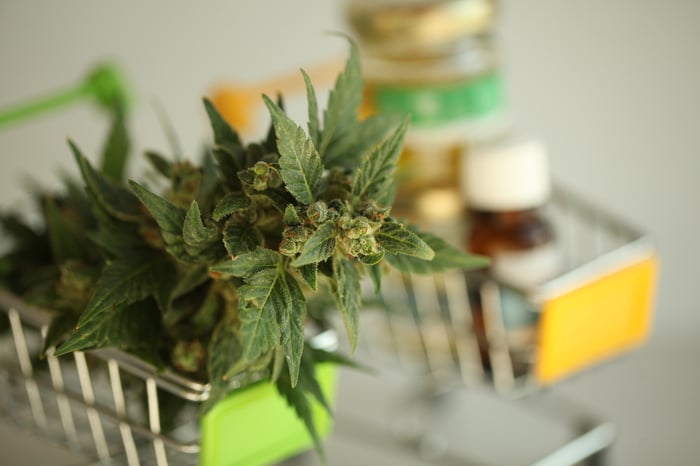Last year was supposed to be a breakout year for marijuana stocks. The stage appeared to be set for a good portion of the industry to push toward profitability. Canada was selling adult-use weed, and higher-margin derivatives were slated to hit dispensary shelves later in the year. Meanwhile, legalization momentum in the U.S. remained strong, striking hope that pot sales would continue to soar.
Unfortunately for investors, none of this came to fruition. In reality, supply issues have continued to persist in Canada, with the official launch of high-margin derivatives being delayed until mid-December. Then, in the U.S., high tax rates in select states (ahem, California) have made it virtually impossible for legal retailers to compete with black-market producers. As a result, marijuana stocks were clobbered in 2019.
One of the more interesting effects of this precipitous decline can be seen on the book value of pot stocks. While book value isn't exactly a valuation measure that cannabis investors would be expected to pay much attention to, the simple fact that three marijuana stocks are now trading below their book value is bound to raise a few eyebrows and catch some attention from value seekers. Of course, as you're about to see, there are very good reasons these below-book-value pot stocks aren't necessarily good deals.

Image source: Getty Images.
Aurora Cannabis: Price-to-book of 0.64
The first marijuana stock that's dropped well below its book value is Aurora Cannabis (ACB -5.15%). After declining by more than 50% in 2019, the most popular pot stock in the world is now worth a mere 64% of its book value. But make no mistake about it: Aurora Cannabis is no deal.
As of the end of Aurora's fiscal first quarter, ended Sept. 30, the company counted $5.61 billion Canadian in total assets. However, CA$3.17 billion of this was recognized as goodwill, with another CA$683 million classified as intangible assets. Put in another context, almost 70% of the company's total assets are built on hope and promises, ratherThat's a recipe for disaster.
The biggest issue for Aurora Cannabis is that it looks to have grossly overpaid for its more than one dozen acquisitions since August 2016. The most egregious of these deals is the CA$2.64 billion paid to acquire MedReleaf. With the Exeter facility now up for sale -- Exeter is a vegetable-growing greenhouse that was supposed to be retrofit to grow at least 105,000 kilos of pot per year -- the pricey CA$2.64 billion deal only wound up netting Aurora 35,000 kilos of annual output and MedReleaf's branding. It's a massive writedown waiting to happen.
Furthermore, Aurora Cannabis doesn't look as if it'll reach operating profitability in fiscal 2020, and the company may struggle to meet its repayment obligations on existing debt, according to some folks on Wall Street. Despite trading for less than book value, Aurora Cannabis is most definitely a pot stock to avoid.

Image source: Getty Images.
iAnthus Capital Holdings: Price-to-book of 0.6
It's important to realize that low book values for pot stocks are occurring in the U.S., as well. Vertically integrated multistate operator iAnthus Capital Holdings (ITHUF 6.90%), which has a presence in 11 states and 30 open dispensaries, is valued at perhaps the lowest price-to-book of any marijuana stock. However, similar to Aurora Cannabis, poor dealmaking looks to be its undoing.
In February, iAnthus Capital completed what would be, at the time, the largest U.S. marijuana deal in history. Unfortunately, the all-stock acquisition of MPX Bioceutical is what's responsible for the majority of the $440.4 million in goodwill (that's in U.S. dollars) the company was carrying around on its balance sheet, as of the end of September. For context, iAnthus' goodwill is 55% higher than the company's current market cap, and it represents 53% of its $831.6 million in total assets.
And it gets worse. Like Aurora, iAnthus has quite a bit of its total assets classified as intangible assets -- $177.5 million, to be exact. This means 74% of the company's total assets are built on finger-crossing and hoping everything goes its way.
Although iAnthus is well-positioned in a handful of U.S. states, and it should see its sales move notably higher in 2020, it's hard to overlook the strong likelihood of a writedown in the not-so-distant future.

Image source: Getty Images.
CannTrust Holdings: Price-to-book of 0.85
Last, but not least, embattled marijuana stock CannTrust Holdings (CNTTQ) is valued at just 85% of its book value. Though this, too, might look like a deep discount, there are number of reasons behind CannTrust's bottom-feeding valuation.
For one, the company admitted in July to growing marijuana illegally in five unlicensed rooms for a period of six months (October 2018-March 2019). This admission eventually led to the firing of now-former CEO Peter Aceto, the destruction of $58 million in illicitly grown pot, and Health Canada handing out a cultivation and sales license suspension in September. That suspension does leave the door open for CannTrust to regain its licenses this year, but for the time being the company is unable to grow new crops or sell any product.
Additionally, CannTrust hasn't reported any of its operating results since May of last year. With the company having been caught with illicit grow, its previous income statements will need to be restated. It might take until the end of the first quarter of this year before the company delivers any of its previous results. Therefore, the company's book value could wind up being very different from the data we have now.
Although I do consider CannTrust a very risky buy for the second half of 2020, its exceptionally low book value plays no role in that belief.





